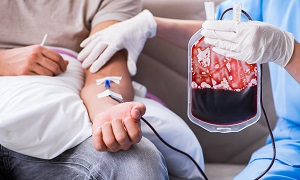Best Anemia Treatment Doctors (Hematololgists) in India
Best Anemia Treatment Hospitals in India
KIMS Hospital, Hyderabad
- City: Hyderabad, India
Hospital Highlights:
- KIMS Hospital (a brand name of Krishna Institute of Medical Sciences) is one of the largest and best multi-speciality hospitals in Hyderabad. The hospital provides various treatments to an enormous number of patients.
- The hospital has a capacity of more than 3000 beds. KIMS Hospitals offers different healthcare services in more than 25 specialities and super specialities.
- The hospital is equipped with modern medical equipment and technology. It has robotic equipment to provide minimal invasive techniques for patients.
- The hospital is aimed at providing world-class healthcare facilities and services at an affordable cost for patients.
- The various specialities and departments of the hospital include neurosciences, gastroenterology & hepatology, robotic science, reproductive sciences, dental science, oncological sciences, organ transplantation, heart and lung transplantation and mother and child care.
Fortis Hospital, Shalimar Bagh
- City: New Delhi, India
Hospital Highlights:
- Fortis Hospital in Shalimar Bagh is a multi-super specialty hospital that strives to provide world-class patient care by leaving no stone unturned.
- Fortis, Shalimar Bagh, with 262 beds and a 7.34-acre footprint, provides the best level of medical care through its team of doctors, nurses, technicians, and management professionals.
Reliance Hospital, Mumbai
- City: Mumbai, India
Hospital Highlights:
- Reliance Hospital is one of the best super-specialty care hospitals in Navi Mumbai.
- The main purpose of this hospital is to become a trustworthy place for the best health and hope for society. The hospital is well connected to the suburbs of Mumbai and Navi Mumbai.
- The hospital has various specialty departments, viz., Accident & Emergency, Anesthesiology, Dental Services, Dermatology, Diabetology, Dietetics Nutrition, Endocrinology, ENT, Gastroenterology, General Surgery, Gynaecology And Obstetrics, Hepato Pancreato Biliary Surgery, Infectious Disease, Internal Medicine, Interventional Radiology, Laboratory Medicine, Minimal Access Laparoscopic Surgery, Nephrology, Neurosciences, Opthalmology, Orthopaedics, Paediatrics, Pain Management Palliative Care, Physical Medicine Rehabilitation, Plastic And Reconstructive Surgery, Psychiatry, Pulmonary Medicine, Radiology, Rheumatology, Transplant, Urology Andrology, Vascular Surgery
Lilavati Hospital & Research Centre, Mumbai
- City: Mumbai, India
Hospital Highlights:
- Lilavati Hospital & Research Centre is India’s premier multi-speciality tertiary care hospital and has been recognised as a global medical excellence centre.
- Lilavati Hospital & Research Centre has built an unrivalled level of trust with its patients over the years, thanks to a solid foundation that comprises cutting-edge facilities, the best medical competence, research, education, and charity endeavours.
- The hospital is quite proud of the fact that it now serves patients from all kinds of backgrounds, not just from the United States but from all around the world.
- The hospital has a total of 323 beds, one of the largest Intensive Care Units (ICUs), 12 Operation Theatres with modern amenities, over 300 consultants, and almost 1,800 personnel.
Venkateshwar Hospital, Dwarka, New Delhi
- City: New Delhi, India
Hospital Highlights:
- State-of-the-art technology and devoted healthcare professionals have been brought together under one roof at Venkateshwar Hospital to provide genuine medical care. The hospital’s professionals work together as a team to deliver the best possible treatment to their patients, using the most sophisticated equipment and information technology.
- Venkateshwar Hospital’s mission is to attain global excellence in healthcare by employing evidence-based, ethical clinical practices and cutting-edge technology by a team of highly skilled experts.
MGM Healthcare, Chennai
- City: Chennai, India
Hospital Highlights:
- Located in Chennai, India, MGM Healthcare is a top multispecialty hospital that provides all medical services under one roof.
- Since its founding in 2019, MGM Healthcare has quickly become a leading national referral centre, creating several innovative flagship initiatives.
- MGM Healthcare combines next-generation medical and digital technologies to provide better patient results.
- With 12 centres of excellence, more than 400 inpatient beds, 100 intensive care unit beds, and 24/7 emergency care, MGM Healthcare leaves no chance in redefining the patient experience in Chennai.
- MGM Healthcare boasts 250+ expert doctors across 30+ departments, including Cardiology, Pulmonology, Neurology, Obstetrics & Gynaecology, and more.
- They house 12 specialized Centres of Excellence, including Neurosciences, Orthopaedics, and Multi-Organ Transplantation.
- Their team of doctors, nurses, and paramedics works together to give every patient individualized treatment.
What is Anemia?
Anemia is a common medical condition in which there is a deficit of Red Blood Cells for carrying oxygen to the various organs of the body. People who suffer from this condition have a low hemoglobin level which is the main protein of the red blood cells. One may feel weak & tired if he/she is suffering from the condition. This is because your body cannot supply the organs with what they need to work.
Anemia is the most common blood condition in many countries that most of the women & children suffer from.
There is a high demand for blood supply in women during their gestation period. Hence, women who have deficient red blood cells suffer from iron deficiency anemia.
Causes of Anemia
There are many causes of the condition and vary from person to person. Let’s have a look at some of the most common causes of anemia.
- Due to decreased RBCs- When the body of a person isn’t able to create the required number of RBCs, the person is more likely to suffer from anemia. This is because your body lacks the essential nutrients, vitamins and minerals and in turn, the RBCs don’t function well.
- Due to blood loss- Many people don’t realize the loss of blood cells through bleeding. Such bleeding takes place over a long duration of time slowly. Non-steroidal anti-inflammatory drugs and many gastrointestinal conditions may cause blood loss in the body leading to anemia. Surgery and trauma may also induce increased blood loss in the body.
- Due to faulty RBC production- The body might not produce red blood cells because of stem cell problems and bone marrow problems. Stem cells are special cells that develop into various cell types. They can vary from brain cells to muscle cells. They have the ability to fix damaged tissues of the body and are potential cells for the treatment of various diseases. The bone marrow is a viscous tissue that fills the bones from inside. The types of bone marrow are red bone marrow and yellow bone marrow. Red bone marrow is responsible for producing the blood cells while yellow born marrow helps to store fat. When there is a deficiency of stem cells in the marrow or they malfunction or other cells replace them, then there is a faulty production of RBCs in the body. Hence, the chances of having anemia increases.
- Due to the destruction of RBCs- A person may suffer from hemolytic anemia if the red blood cells in his body are fragile and cannot travel throughout the body, resulting in bursting of RBCs. An attack on the immune system or enlarged spleen may also cause hemolytic anemia.
Symptoms of Anemia
Following are the common symptoms associated with the condition:
- Anemic patients appear pale and cold.
- Anemic patients suffer from fatigue and weakness. Most of the time they feel dizzy and tired.
- Anemics suffer from lightheadedness. Such people encounter trouble in concentrating on anything.
- You may also find some oral symptoms in anemic people. They have inflammation in their tongue which results in the red, painful, smooth, and glossy tongue.
- Severe symptoms of anemia include fainting. Unusual heartbeat and headache are common in anemics.
- Children and teenagers suffer from growth problems. They have pain in their bones and joints.
- On physical examination, the symptoms include low or high blood pressure, an increase in the heart rate, jaundice and heart murmurs. Sometimes, the person suffers a heart attack.
- Chest pain, brittle nails, and shortness of breath are some other symptoms found in anemic patients.
Types of Anemia
The distinct types of anemia are:
- Aplastic Anemia– When your body doesn’t produce adequate red blood cells then there are more chances of aplastic anemia. Autoimmune diseases, exposure to toxic chemicals and infections may induce aplastic anemia.
- Sickle Cell Anemia– It is a hemolytic anemia that a person inherits from his parents. A defective form of hemoglobin causes this condition as the red blood cells take the shape of a sickle. The cells die prematurely while leads to a shortage of red blood cells.
- Iron Deficiency Anemia- The bone marrow makes hemoglobin with the help of iron. Your body cannot make hemoglobin for the red blood cells with a deficiency of iron. The deficiency of iron in the body causes iron-deficiency anemia.
- Vitamin Deficiency Anemia- Human body needs vitamins and minerals for the healthy production of the red blood cells. If your body lacks essential vitamins and nutrients, then the production of the red blood cells decreases leading to vitamin deficiency anemia. Another name for vitamin deficiency anemia is pernicious anemia.
- Thalassemia– This is an inherited condition which causes decreased hemoglobin level than normal. Hemoglobin is responsible for the distribution of oxygen to the tissue organs through the red blood cells. The condition leads to anemia, which causes fatigue.
Diagnosis of Anemia
Following are the common diagnostic tests for Anemia:
- A complete blood count test helps to form a diagnosis. CBC measures the hemoglobin, red blood cells and other composition of blood.
- A differential count or blood smear also helps in forming a diagnosis by counting the white blood cells in the blood. These tests help in checking the unusual cells and in checking the shape of the red blood cells.
- The reticulocyte count helps to check for the immature red blood cells in the blood.
Treatment options of Anemia
The treatment options for different types of Anemia are as follows:
Aplastic Anemia
Blood transfusions are the best treatment for aplastic anemia. Blood transfusion helps to boost the number of RBCs in the body. Also if the bone marrow doesn’t have the potential to make healthy RBCs, then bone marrow transplant can help in treating the condition.












